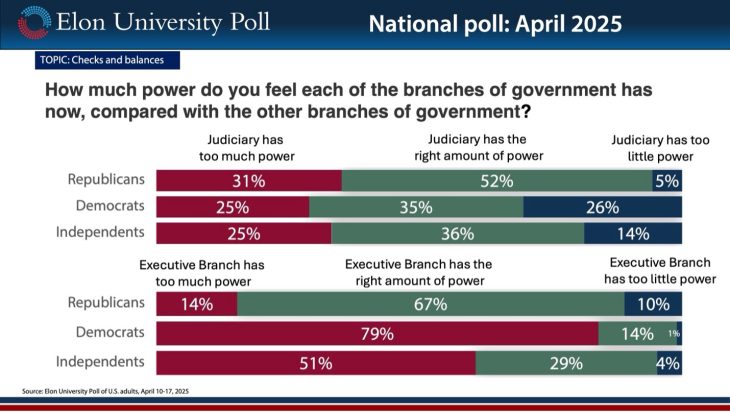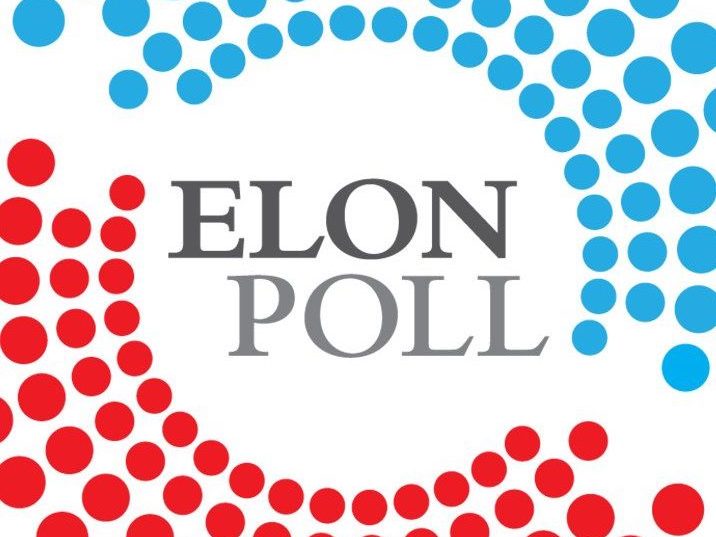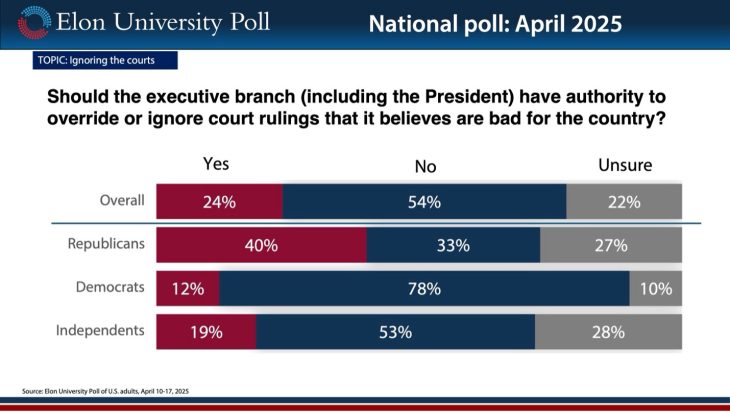The latest national survey by the Elon University Poll finds a drop in President Donald Trump's approval rating with additional views on Trump's executive orders, limits on presidential authority, balance of powers, and the U.S. Supreme Court.
A new national poll conducted by Elon University reveals significant public concern about the balance of power between the executive branch and the courts, with 67% of Americans expressing concern about a potential constitutional crisis arising from conflicts between the branches.
The poll, which surveyed 1,000 American adults nationwide April 10-17, 2025, explored public opinions about the U.S. judicial system and the growing conflict between the Trump administration’s use of executive orders and judicial rulings that delay or block those actions.
By April 22, the nonpartisan law and policy journal, Just Security, had documented 206 legal challenges against Trump administration actions, and a tracking effort by the New York Times found that at least 98 judicial rulings had at least temporarily paused some of the administration’s efforts.
- Elon University Poll topline for Trump approval rating and views on the courts (April 2025)
- Elon University Poll charts and analysis for Trump approval rating and views on the courts (April 2025)
Trump approval and executive orders
Three months into his presidency, Donald Trump’s approval rating is declining, with 41% approving of his job performance and 47% disapproving. That compares with a 45% approval-41% disapproval rating in the February 2025 Elon University Poll.
Public opinion is split on his executive actions:
- Overall, 47% of respondents believe President Trump’s executive orders have mostly gone too far, while 36% believe they have mostly been correct. An overwhelming 83% of Democrats said Trump’s orders have gone too far, while 73% of Republicans said Trump’s actions have mostly been correct.
- In responding to a similar question, 47% said federal judges’ rulings blocking or delaying Trump administration actions have mostly been correct, while 34% believe these rulings have mostly gone too far. The partisan split on this question was not quite as wide: 72% of Democrats said judicial actions have mostly been correct, while 55% of Republicans said the courts have gone too far.
“Despite declining trust in the Supreme Court over the decades, we are finding that even many of President Trump’s supporters have some pause when it comes to conflicts between the executive and judicial branch,” said Jason Husser, director of the Elon University Poll. “Less than a majority of Republicans (40%) thought the executive branch should have authority to ignore court rulings that it believes are bad for the country. Meanwhile, a slim majority of Republicans (52%) thought the judiciary had the right amount of power.”
Balance of powers
In assessing the powers of the three branches of government, only 10% said the current system of checks and balances is very effective, with 34% saying it is somewhat effective and 32% saying it is somewhat or very ineffective.
The largest group of respondents said the balance of power has tipped toward the executive branch:
- 46% of respondents believe the executive branch has too much power, compared with 27% who said the judiciary is too powerful and 19% who said the legislative branch has too much power.
- 79% of Democrats said the executive branch has too much power, while only 25% said the judiciary has too much power and only 17% said the legislative branch has too much power
- Republicans tended to say the powers of the three branches of government are in balance, with 67% saying the executive branch has the right amount of power, 58% saying the legislative branch has the right amount of power and 52% saying the judiciary as the right amount of power
The perception of an imbalance of power is underscored in views about a potential Constitutional crisis. A large majority (67%) said they are very or somewhat concerned that the executive branch and the courts may reach a point where neither side will back down, creating a crisis over who has the final say on an issue. Among Democrats, 88% expressed concern about a Constitutional crisis compared with 61% of Independents and 51% of Republicans.

Presidential authority and impeachment
On questions of presidential authority to override courts:
- 54% of Americans believe the executive branch should not have authority to override or ignore court rulings it believes are bad for the country, while 24% believe it should have this power
- 40% of Republicans said the president should have the authority to ignore court rulings, compared with 33% who opposed that power; 78% of Democrats and 53% of Independents said the president should not be able to override the courts
- On impeachment, 37% believe Congress should impeach a president who does not obey a court order, 14% believe it should not, and 40% say it depends on the issue at stake
- Conversely, only 14% believe Congress should impeach federal judges who block executive actions, while 35% say no and 39% say it depends on the issue
Presidential pardon power and immunity
On presidential powers:
- 42% believe presidents should have the power to pardon individuals convicted of federal crimes, while 33% disagree
- 46% oppose presidential immunity from criminal prosecution for official acts, while 31% support it
Executive orders targeting law firms
The poll addressed Trump’s executive orders penalizing law firms that represent clients challenging his policies. The penalties have included withholding government contracts and security clearances, and restricting access to government buildings.
- 50% of Americans believe these actions are an attempt to intimidate lawyers into not opposing him, while 34% believe he is trying to prevent abuse of the legal system by lawyers
- The views split heavily along party lines, with 85% of Democrats seeing the president’s orders as intimidation compared with just 19% of Republicans
“Americans are clearly questioning whether the rule of law and our constitutional structure are built to withstand the pressures of the current political moment,” said Zak Kramer, dean of Elon University School of Law. “There’s a lot of uncertainty about how these disputes will turn out, and things are moving fast, so we shouldn’t be surprised that most Americans view these questions through a heavily polarized lens.”
Trust in the Supreme Court
Americans were split on the question of whether they have confidence in the U.S. Supreme Court, with 51% saying they have a great deal or a fair amount of confidence in the high court and 49% saying they have little or no confidence. A strong majority of Republicans (72%) expressed some measure of confidence in the Supreme Court compared with only 35% of Democrats and 39% of Independents.
Across all demographics, Americans think the Supreme Court leans conservative, with only 21% saying the court is balanced, compared with 42% who think the court is conservative and only 12% who say it is liberal.
Department of Justice
Overall, 69% of Americans said the president should not influence cases or daily operations of the Department of Justice compared with only 13% who said that kind of involvement by the president is proper. This principle is supported by large majorities of both Democrats (83%), Independents (65%) and Republicans (61%).
Trump’s claims that Democrats have used the Department of Justice and judicial processes against him are only believed by 38% of poll respondents, while 43% think his assertions are wrong. There is a wide partisan split on this issue, with 75% of Republicans believing Trump’s claims compared with only 9% of Democrats.
Poll Methodology
Access the poll topline and methodology at: www.elon.edu/elonpoll. The survey was developed by the Elon University Poll and fielded by the international marketing and polling firm YouGov as an online, web-based survey, self-administered with online panels. Between April 10 and April 17, YouGov interviewed 1,149 U.S. adults aged 18 and older. These respondents were then matched down to a sample of 1,000 to produce the final dataset.
Throughout this report, the analysis of partisan differences compares the views of Republicans plus those who lean Republican in their voting preference with Democrats plus those who lean Democratic. The margin of error for this poll (adjusted for weights) is +/-3.58%.
About the Elon University Poll
Established in 2000, the Elon University Poll conducts national and North Carolina surveys on issues of importance to voters and residents. Information from these polls is shared with media, citizens and public officials to facilitate informed public policy making through the better understanding of citizens’ opinions and attitudes. The poll is fully funded by Elon University and operates as the neutral, non-biased information resource.
The Elon University Poll is a charter member of the Transparency Initiative, a program created by the American Association for Public Opinion Research (AAPOR) in 2014 to educate polling firms on ways to better share how they collect and interpret their information. The Elon Poll’s voluntary participation in this initiative signifies a willingness to clearly state in its reports how questions were asked, in what order, who funded the poll and then conducted it, and a definition of the population under study, among other details.




